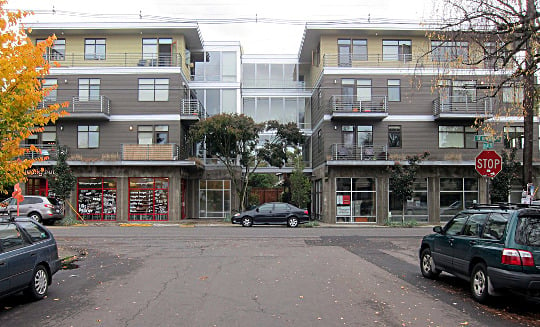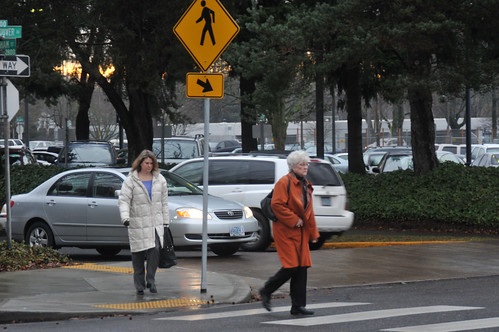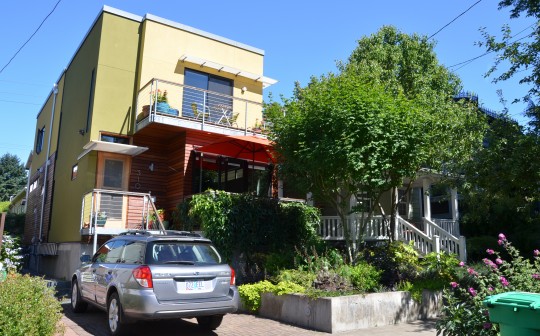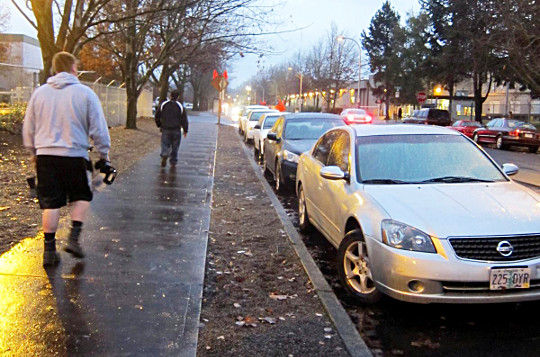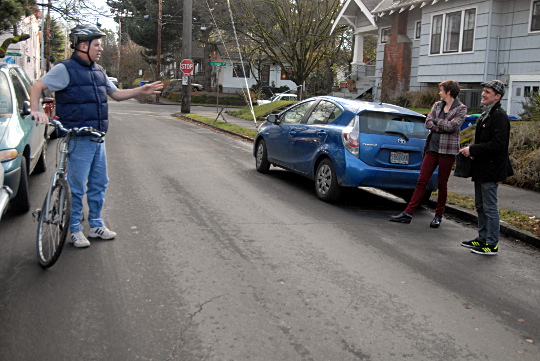
(Photos: M.Andersen and J.Maus/BikePortland)
Last year, Portland hired a top-dollar consulting firm for advice on the best way to manage the auto parking that’s become increasingly scarce in a few neighborhoods.
Twelve months later, the city is taking steps toward some of its recommendations: for example, proposing an opt-in parking permit system that would let residential neighborhoods block their street parking spaces from being used by people living or shopping on commercial corridors.
But at the moment, Portland is on course to ignore a different suggestion made very clearly by the firm, Nelson\Nygaard: that elected officials should “never, ever” be the ones to set the price of parking.
“It’s so important to save the elected officials from themselves — their job is to adopt policy, their job is not to micromanage the city,” said Jeff Tumlin, the top parking expert at San Francisco-based consultancy. Setting the price of on-street parking, he said, is “not a city council’s job. It’s really bad. These conversations quickly get so emotional and irrational that they should never be argued at city council.”
Instead, Tumlin said city councils should agree on the outcome they’d like to see: one available parking space on every block, for example, or one guaranteed parking spot for every home in a residential neighborhood. Then they should direct their staff to come up with meters, permits, quotas or other systems to get to that outcome.
Tumlin spoke in an interview with BikePortland Wednesday that reiterated the advice he gave a roomful of 130 Portlanders back in June.
“If I were an elected official, the last thing I would ever want is to have parking prices on the agenda.”
— consultant Jeffrey Tumlin
“If I were an elected official, the last thing I would ever want is to have parking prices on the agenda,” Tumlin said. “Even if you satisfy your constituents on the parking issue, you often have not satisfied them, because the real issue is something else.”
But as Portland considers letting neighborhoods vote to create overnight residential parking-permit districts, the city staffer managing the project said the current plan is for city council to make all the permit pricing decisions.
“City Council adopts the transportation fee schedule annually by ordinance,” city project manager Grant Morehead said Wednesday. “The fee structure of the residential parking permits will be adopted through this annual process.”
One week from today, the city’s year-long parking reform process will get a Portland City Council work session for the first time. In preparation for that, we talked to a few experts around town to find four ways that Portland could follow its consultant’s advice.
Here they are.
Advertisement
1) City staff could take an informed guess about the right permit price and see what happens
The most obvious way for Portland to follow Tumlin’s advice would be to simply have the city’s appointed staff, instead of their elected bosses, take a stab at the right price.
This wouldn’t be an impossible task. Staffers could base the price on what it is in other cities, or on the going rate for off-street parking in the neighborhood, or simply make sure it covers the cost of administration and enforcement.
Morehead, one of the staffers who’d likely be involved with that effort, said Wednesday that this wouldn’t work well, because parking permits last for a full year. If the city guesses wrong, it might have to keep fiddling with the permit price for several years to get it right.
“The time frame is so long,” Morehead said.
Advantages: Straightforward. Responsive to political pressure.
Disadvantages: Could take years to get right. If the price is too low, there could be years-long waiting lists for a parking permit. If it’s too high, no neighborhood will ever vote to create a permit district and the whole policy will be pointless.
2) The city could let neighborhood groups add to their district’s permit price and use the money for things they want
If a city parking permit goes for, say, $11 a month — that’s what they cost in Toronto and San Francisco — the city could give neighborhood groups the option of tacking on a few more bucks that would raise money for neighborhood infrastructure (a crosswalk beacon, a bus shelter, a public trash can) or programs that reduce driving to the area (subsidized transit passes for employees of local shops). That’s what the Central Eastside Industrial District already does with its daytime parking permits.
Advantages: Would let neighborhoods set rates appropriate to their area (Hollywood’s parking permits are probably more valuable than the ones in St. Johns). Would give neighborhoods a reason to create permit districts: it could become a steady source of cash for some neighborhood associations.
Disadvantages: There’s no reason to think neighborhood association leaders would be any better than elected officials or city staff at figuring the right price. If they get it wrong, see “disadvantages” beneath the previous item.
3) The city could let people resell permits they don’t need
This simple measure would have surprisingly far-reaching results.
When someone signs up for a parking permit, one of the things it could include would be the right to give it to someone else.
This simple measure would have surprisingly far-reaching results.
This is a suggestion from Portland Planning and Sustainability Commissioner Chris Smith, who said he sympathizes with longtime residents of neighborhoods that have been getting denser.
“We’ve flooded their streets with cars,” he said. Smith said it makes sense for “folks who’ve had their lives changed” to get something for that trouble, if they vote to create a parking district: a spot at the front of the line for a parking permit, if they want one. Or, if they don’t want one, the ability to get a permit and then resell it to anyone else who might want it: a resident of a nearby apartment, the manager of a nearby restaurant.
If every permit in a district were sold — except maybe for an allowance the city would reserve for poor residents or people with disabilities — someone who wanted a permit would track down someone who didn’t need theirs and buy it. When people left the neighborhood, they could sell their permit to whoever might be moving in, or just let it return to the city’s pool of unused permits.
Advantages: Residents would set the price of their permits for themselves by deciding what they’re willing to pay for one. People would have a reason to vote for permit districts because they would be creating a valuable commodity for themselves.
Disadvantages: Doesn’t earmark money for neighborhood projects or services. Creates a stronger sense that residents own public space when they don’t.
4) The city could sell permits with a Vickrey auction.
Each year, everybody interested in a permit for a given district could record what they’re willing to pay for it. Say the district had X available parking spaces. The city would put all the bids in descending order, count down X slots and give permits to everyone in that group … but they would only have to pay the price bid by person X, the cheapest of all the winning bids.
This is a concept from Tony Jordan, president of the Sunnyside Neighborhood Association and one of the city’s most active volunteer parking wonks. It uses the same system that Google used when it started issuing public stock.
“Say you have 5 things for sale, you have bids for $1000, $900, $800, $700, $600, $500, and $400,” Jordan explains. “Everyone who bid $500+ gets the item at $500.”
Advantages: Residents would set the price of their permit for themselves by deciding what they’re willing to pay for one. Would raise a lot of money for either the city or neighborhood improvements.
Disadvantages: Complicated. People might not vote to create a system they don’t understand.
After puzzling through these options, I had one more question: is this question — how to remove parking permit prices from the direct oversight of the city council, as Tumlin recommended — even part of the parking permit committee’s job?
Absolutely it is, said Lidwien Rahman of the Oregon Department of Transportation. She ought to know; she awarded the grant that is paying for the city’s reform effort.
In fact, Rahman seemed to hope that the committee will help the city answer this question: not exactly how much the permits would cost, but how to find the right price.
“The advisory committee can definitely recommend whatever they want,” Rahman said.
— The Real Estate Beat is a regular column. You can sign up to get an email of Real Estate Beat posts (and nothing else) here, or read past installments here.





